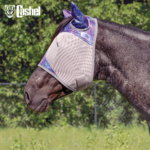The word “dressage” comes from the French word dresser, to train. To the untrained eye it looks easy, but like so many equestrian sports, it is quite complicated. Dressage is an Olympic equestrian sport, but also a basic training discipline for the backyard horse.

Dressage teaches a horse to be obedient, willing, supple and responsive. The horse freely submits to the rider’s lightest “aids” or body signals, while remaining balanced and energetic. The object of dressage is the harmonious development of the horse in both mind and body, and every horse, regardless of its type or use, can benefit from this training.
Dressage principles are a logical, step-by-step progression from simple to increasingly complex movements. More and more is asked of the horse as it becomes mentally and physically ready to respond to these demands.
The graceful movements performed in competition may look effortless, but are the result of years of training. The aids should be virtually imperceptible. A squeeze of the calf, a closing of the fingers, a shifting of the rider’s weight in the saddle should be all that is necessary to tell the horse what is required.
Dressage requires the horse and rider to combine the strength and agility of gymnastics with the elegance and beauty of ballet. The result is truly the best blend of sport and art. The highlight of a dressage competition is the Musical Freestyle in which the rider creates and choreographs to music an original ride of compulsory figures and movements.
Discipline Association: United States Dressage Federation
Information provided by the United States Equestrian Federation



